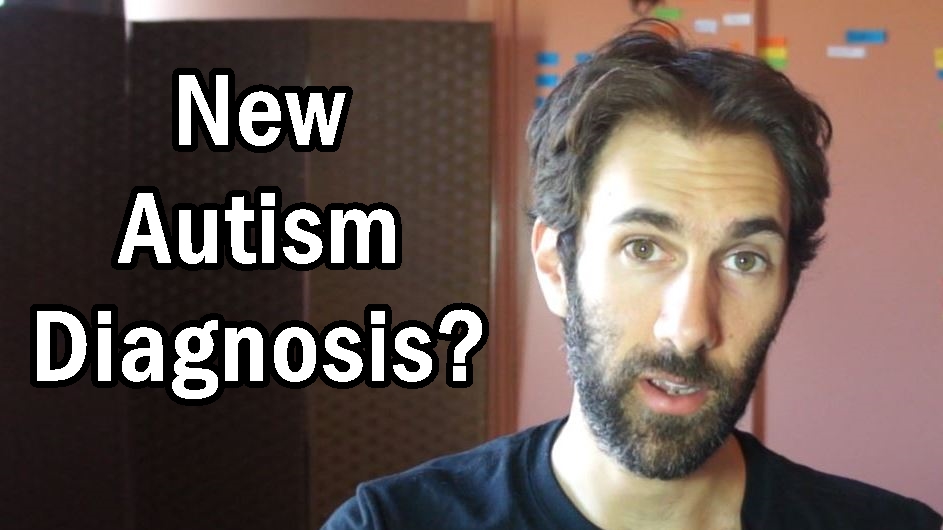Robert Dewaele
Today’s story was contributed by Robert Dewaele from the U.S.A.
A couple of months ago, he came across my YouTube blog and became intrigued with what he described as a “very lucid explanation of what it means to be an Aspergian”. He hopes his story will emphasize the critical need for an accurate diagnosis.

Misdiagnosis, then correct diagnosis…
My Asperger’s diagnosis story. Robert Dewaele
I’m a 62 year old male from the United States. I currently work as an agricultural crop insurance claims adjuster. I’m also a wood and bronze sculptor. I’ve always been an introverted person, who has sought to avoid social situations. I’m much happier pursuing solitary endeavors and I’m quite certain this part of my personality had much to do with me taking up sculpting.
From my late teenage years onward, I began to realize that I was suffering from emotional depression. I didn’t mention this to anyone else, but my mother told me later that she realized that I was depressed, but didn’t know what to do about it. It seemed that my depression worsened over the years.
My depression went untreated until the age of 31. About that time, I became acquainted with a psychiatrist who was married to an artist friend of mine. He seemed to take an unusual interest in me, and he was always very kind toward me. After I had known him for about a year, he asked me if I would consider seeing him on a professional basis,which I agreed to. He was very distressed about my overall psychological health and soon diagnosed me as having Bi-polar disorder. He started with the usual medication routine, but he had a nagging feeling that there was a separate disorder present, but he couldn’t “put his finger on it”. He died soon after that, and I was passed from one psychiatrist to the other. None of them could see outside of the box far enough to do anything but treat me for Bi-polar disorder.
Eventually, a more curious psychiatrist could see that the medications weren’t doing me any good. He suggested ECT, more commonly known as electro-shock therapy. I received a total of about 12 of those treatments, but only received a minimal reduction in my depression, altogether.
After continued and failed medication experiments, I sought the help of a mental health therapist. We had weekly sessions and he specialized in cognitive behavioral therapy. I seemed to make some progress with the therapy and I was surprised that I finally found a practitioner who I could communicate with and trust.
After seeing him for about three months, he came to the conclusion that I might have been misdiagnosed. He thought that it was more likely that I had a developmental disorder rather that being Bi-polar. He traveled to the University of Texas to visit his son who is a professor there. While there, my therapist went to the library and researched Asperger’s disorder. He brought back a book by Tony Atwood and several other documents which he had me read. He didn’t tell me what he thought, but asked me what my opinion was after reading everything. I told him I read my life story in those documents. From that point on, I went off most of the medications which I had been taking and relied upon therapy and self education to get a handle on things. We tried “mindfulness” exercises, but after going through them, I would come to and ask the question…now what? Mindfulness was not helpful. I ground myself through being very active and inquisitive, which is probably the opposite of mindfulness. My therapist calls me a human doing, not a human being, which I find humorous.
I still wanted a more definitive diagnosis, so I interviewed three psychologists and took a battery of written tests. All of this effort confirmed the correct diagnosis of Aspergers syndrome. Therapy is a very long process. My sessions have become much less frequent, but I will always need some sort of on-going therapeutic help to overcome doubts over my capability to lead a normal life. I need a connection with a practitioner who is honest and more on the normal side of things than I am. I was fortunate to have found such a person.
My feeling over learning my correct diagnosis has been quite a mixed bag, I’ve long realized that I’m quite different from most people. One of the psychologists who did the testing bluntly told me that most people would never understand me. How is that for encouragement!! It is good to finally understand my condition, though.
Over the years, I’ve had less need to communicate with others than most people do. Due to my reticence, my communication skill deficits aren’t always apparent. I’m quite uneasy with meeting people for the first time. I have to hang back and try to develop an understanding of the other person before I can reciprocate. I’m sure that the delay in my reciprocation has cost me many friends over the years.
Understandably, I’ve developed quite combative relationships with other medical professionals. Much of what could be considered a normal life has been taken away from me through the incompetence of several medical professionals in the past.
On a more positive note, I can now easily empathize with people who are on the fringes of society. I try to help them and be supportive whenever I can. Being randomly sociable isn’t enough for me as I need to find a substantial commonality with another person before I can comfortably communicate. Having spiritual faith has also helped in the most trying times.
In summary, I advise any person who is having doubts about their feelings and emotions and their place in the world to seek out honest, competent and caring professional help. I had no idea about Asperger’s disorder until I was 52 years old. I can’t replace all that I’ve missed out on over the years. It is now up to me to have the best understanding that I can about my condition, try to accept myself for who I am now, then forge ahead in areas that I can excel in and control.
I’m very grateful that I encountered Paul Micallef’s wonderful videos on You Tube. They can really open up our world to us in a very meaningful way.



